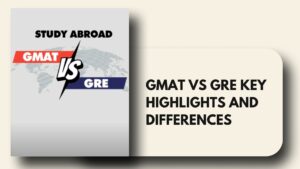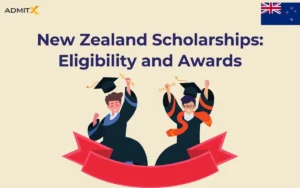Australia is the 4th most popular destination for Indian students studying abroad, following the USA, UK, and Canada. Australia offers a wide range of options in higher studies, such as accountancy, business management, arts, science, and more, at its prestigious universities and colleges.
Australia offers students a lively lifestyle and a chance to experience a rich culture. It also provides support for career development after study.This blog explores the top reasons to study in Australia, the country’s education system, popular universities, courses, and much more.
- Why Study in Australia? Top Reasons
- Study in Australia: An Overview
- How Does the Australian Higher Education System Work?
- Australia Qualifications Framework
- Study Intakes in Australia
- List of Universities in Australia
- Popular Courses in Australia
- Study in Australia: Eligibility Criteria & Documents Checklist
- How to Apply for Australian Universities?
- Study Visa for Australia
- Key Takeaways by AdmitX
- FAQs
Why Study in Australia? Top Reasons
Below, we have highlighted the benefits of studying in Australia for Indian students.
Presence of Group of 8 Universities: The group of 8 or Go8 universities of Australia consists of 8 universities, which are pioneers in providing excellent education and research facilities to international students. Approximately 55% of the science graduates and 40% of the engineering graduates of Australia are educated at these Go8 universities.
Top Choice for Indian Students: Around 95,000 Indian students are currently enrolled in various study programs across the country, representing the 2nd largest group of international students in Australia.
High Quality of Life: Australia is home to beautiful beaches, coral reefs, big mountains, lush rain forests, and culturally rich cities and towns that make the journey of an international student memorable.
Promising Career Development Scope: While studying in Australia, international students are permitted to work up to 24 hours per week, compared to a limit of 20 hours per week in many other countries. This allows students to earn more while gaining valuable professional skills.

Study in Australia: An Overview
| Number of Intakes/Sessions | 3 (February, July, Nov) |
| Medium of Instruction | English |
| Duration of Study | Undergraduate- 3 Years Master's- 1-2 Years PhD- 3-5 Years |
| Number of Public Universities | 37 |
| Number of Private Universities | 3 |
| Cost of Study (Per Year) | AUD 8,000-60,000 (INR 4 Lakh-30 Lakh) |
| Living Expenses (Per Year) | AUD 13,000-44,000 INR 7 Lakh-24 Lakh) |
| Visa Type | Student Visa (Subclass 500) |
| Popular Courses | Accountancy Agricultural Sciences Architecture Business Management Computer Science Engineering Nursing Psychology Tourism & Hospitality |
How Does the Australian Higher Education System Work?
To study in Australia, it is important for an Indian applicant to understand the basics of the Australian higher education system and the Australian Qualifications Framework (AQF).
School Education
The Australian education system is almost the same as that of India, where students invest their first 13 years in earning the KG, primary, secondary, and senior secondary education.
Foundation Courses/Pathway Programs
The pathway programs offer international applicants the opportunity to fulfill the academic requirements to enroll in Australian universities if they don’t meet the direct entry requirements. The duration of such courses is around 1 year.
University-Level Programs
The university-level programs come under the broad category of
- Bachelor’s: The duration of bachelor’s degree courses are 3 years, whereas the duration of bachelor’s honours degree courses is 4 years.
- Master’s: The duration of master’s courses is 2 years.
- Doctoral: The duration of doctoral and PhD programs varies between 3 and 5 years, depending on the specialisation.
Australia Qualifications Framework
- The Australian Qualifications Framework comprises post-secondary education levels that ensure that the national education system of Australia meets the standard of teaching, research, and innovation.
- The qualifications earned through AQF are nationally accredited and internationally recognised.
- Each qualification earned can pave the way for further education and career advancement.
- There are 10 levels of qualifications, as listed below.
| Level | Qualification | Duration | Description |
|---|---|---|---|
| 1 | Certificate I | 6 Months-1 Year | Prepares students for basic work roles. |
| 2 | Certificate II | 6 Months-1 Year | Prepares students for entry-level employment. |
| 3 | Certificate III | 1-2 Years | Prepares students for skilled and vocational training work. |
| 4 | Certificate IV | 1-2 Years | Prepares students for undertaking diploma and university-level programs. |
| 5 | Diploma and Advanced Diploma | 2 Years | Develops technical skills. |
| 6 | Associate Degree | 2 Years | Bridge course between diploma and bachelor's level. |
| 7 | Bachelor's Degree | 3 Years | It combines advanced theoretical and research frameworks. |
| 8 | Bachelor's Honours/Graduate Certificate/Graduate Diploma | 1 Year | Prepares students for further research and study options at the post-graduate level. |
| 9 | Master's Degree | 1-2 Years | Prepare students for employment, further study, and research options. |
| 10 | Doctoral Degree | 3-5 Years | Students can be involved in academic and industrial-level research work. |
Study Intakes in Australia
There are primarily 2 study intakes in Australia. They are February intake (semester 1) and July intake (semester 2). Some Australian institutes also accept admissions for December intake (semester 3) in selected courses.
| Intakes | Commencement of Application | Application Deadlines | Commencement of Classes | Type of Courses |
|---|---|---|---|---|
| Semester 1 (Feb intake) | September 2024 | December 2024 | February/Early March 2025 | All courses |
| Semester 2 (July intake) | February 2025 | May-June 2025 | July/Early August 2025 | Majority of Courses |
| Semester 3 (November intake) | June 2025 | September-October 2025 | October/Early November 2025 | Some in-demand courses |
List of Universities in Australia
9 Australian universities are ranked among the top 100 institutions globally in the QS World University Rankings 2025. Below, we have tabulated the global rankings and average tuition costs at popular universities in Australia.
| University | QS World University Rankings 2025 | Average Cost of Study- Bachelor's (Per Year) | Average Cost of Study- Master's (Per Year) |
|---|---|---|---|
| University of Melbourne | 13 | AUD 37,000-50,000 | AUD 40,000-57,000 |
| University of Sydney | 18 | AUD 46,000-57,000 | AUD 45,000-60,000 |
| University of New South Wales | 19 | AUD 47,000-54,000 | AUD 45,000-55,000 |
| Australian National University | 30 | AUD 44,000-53,000 | AUD 47,000-53,000 |
| Monash University | 37 | AUD 42,000-56,000 | AUD 44,000-57,000 |
| University of Queensland | 40 | AUD 43,000-50,000 | AUD 40,000-50,000 |
| University of Western Australia | 77 | AUD 30,000-49,000 | AUD 35,000-55,000 |
| University of Adelaide | 82 | AUD 35,000-49,000 | AUD 38,000-50,000 |
| University of Technology Sydney | 88 | AUD 24,000-35,000 | AUD 30,000-50,000 |
| RMIT University | 123 | AUD 35,000-49,000 | AUD 37,000-51,000 |
Popular Courses in Australia
Below are tabulated the popular courses in Australia, along with their major degree types and average tuition fees. The tuition fees for a particular degree may vary depending on the university.
| Popular Course | Major Degree Types | Average Tuition Fee (Per Year) |
|---|---|---|
| Accountancy | Bachelor of Commerce Bachelor of Accounting Master of Accounting Master of Professional Accounting | AUD 49,000-60,000 |
| Architectural Sciences | Bachelor of Design Bachelor of Architectural Design Master of Architecture | AUD 34,000-50,000 |
| Agricultural Sciences | Bachelor of Agriculture Science Master of Agriculture Science | AUD 37,000-50,000 |
| Arts & Culture | Bachelor of Arts Bachelor of Visual Arts Master of Creative Writing Master of Arts & Social Sciences | AUD 37,000-48,000 |
| Business Management | Bachelor of Commerce Bachelor of Digital Business Bachelor of Business Administration Master of Business Administration Master of Business Analytics | AUD 50,000-80,000 |
| Computer Science & IT | Bachelor of Computing Bachelor of Science (CS) Bachelor of CS Master of CS Master of Data Science | AUD 45,000-60,000 |
| Electrical Engineering | Bachelor of Electrical Engineering Bachelor of Electrical Engineering (Honours) Master of Engineering in Electrical Engineering | AUD 37,000-57,000 |
| Nursing | Bachelor of Nursing Master of Nursing | AUD 37,000-48,000 |
| Psychology | Bachelor of Arts Bachelor of Psychology Master of Psychology | AUD 35,000-57,000 |
| Hospitality Management | Bachelor of Tourism, Hospitality and Event Master of International Hotel Management | AUD 25,000-50,000 |
Study in Australia: Eligibility Criteria & Documents Checklist
The eligibility criteria depend on the university, course, and degree type students want to pursue. Let’s discuss some of the general eligibility criteria for bachelor’s, master’s, and doctoral programs at Australian universities in detail.
Bachelor's Courses
Academic Requirements
- In general, Indian applicants must complete their 10+2 education in any government-recognised school (CBSE/ISC/state boards) with final average marks of 65-80%.
- The average marks are calculated based on the best 3 or 4 subjects, excluding English language and non-academic subjects.
- Applicants are required to hold at least 2-3 pre-requisite subjects in their higher secondary education relevant to the particular degree program to which they aspired to apply.
- If applicants do not meet the academic requirements directly, they may be required to complete foundation or bridge courses at the same Australian university.
- Upon successful completion of the foundation course, applicants become eligible and can gain enrollment in their chosen degree program.
- Alternatively, applicants can appear in the following types of entrance exams to gain direct entry into their chosen program.
| Entrance Exam | Related Course |
|---|---|
| STAT (Special Tertiary Admission Test) | All types of UG courses |
| UCAT ANZ (University Aptitude Clinical Test) | Medical and health science programs |
English Language Proficiency Requirements
- Indian applicants are required to meet the following English language proficiency criteria to gain admission into undergraduate programs at any Australian university.
- TOEFL iBT: 79-90
- IELTS Academic: 6.5-7.5
- PTE: 64-80
- Test waivers are also available to certain international students on a case-to-case basis, such as
- 70-75% grade in English Core subject at 10+2 level OR
- Enrollment in a university-specific English entry course before joining the main study course. OR
- Completed ELICOS program before joining the study course. OR
- The primary mode of instruction in the previous educational setting was English
Age-Related Requirements
- Depending on the university and course, the minimum age of an international applicant should be at least 18 years.
- Some universities require applicants to submit their parent’s/legal guardian’s consent if they are unable to fulfill the above requirement.
Other Requirements
- In certain courses, like arts, design, and music, applicants are required to either submit a portfolio or appear in an audition or interview.
- In some cases, interviews can be an integral part of the admissions process.
Documents Required
Depending on the institute and course, the following documents must be submitted when applying for an undergraduate program at an Australian university.
- Original previous academic documents (10th and 12th school marksheets, passing certificate, transfer certificate, etc.)
- Proof of English Language Proficiency (IELTS/TOEFL/PTE etc.)
- University application form
- University application fee (AUD 50-100 or INR 2,700-5,500)
- 1 Statement of Purpose or Personal Statement (if required)
- 1 Letter of Recommendation
- 1 CV/Resume
- Portfolio (if required)
- Passport
- Proof of funds to cover the tuition and living expenses (depending on the university)
- Health and medical fitness report
Master’s Courses
Academic Requirements
- Applicants must have completed their 3-4 year bachelor’s degree program in the relevant field.
- The GPA or average marks (WAS) should be around 60-80%, depending on the aspiring master’s course and university.
- If the candidate cannot meet certain academic requirements directly, they must appear in university-specific entrance exams or complete graduate certificate courses.
English Language Proficiency Requirements
- Indian applicants are required to meet the following English language proficiency criteria to gain admission into master’s programs at any Australian university.
- TOEFL iBT: 80-100
- IELTS Academic: 6.5-7.5
- PTE: 64-80
- Test waivers are also available to certain international students on a case-to-case basis, such as when the primary mode of instruction in the previous educational was English.
Other Requirements
- In certain courses, like arts, design, and music, applicants are required to either submit a portfolio or appear in an audition or interview.
- Certain courses, like MBA and engineering programs, require applicants to have at least 3-5 years of work and project-handling experience.
Documents Required
Depending on the institute and course, the following documents must be submitted while applying for a master’s program at an Australian university.
- Original previous academic documents (undergraduate marksheets, UG degree certificate, passing certificate, transfer certificate, etc.)
- Proof of English Language Proficiency (IELTS/TOEFL/PTE, etc.) or MOI certificate
- University application form
- University application fee (AUD 50-100 or INR 2,700-5,500)
- 1-2 Statement of Purpose or Personal Statement
- 1-2 Letter of Recommendation
- GMAT/GRE scorecard (if required)
- 1 CV/Resume
- Work experience certificate (depending on the course)
- Portfolio (if required)
- Passport
- Proof of funds to cover the tuition and living expenses (depending on the university)
- Health and medical fitness report
How to Apply for Australian Universities?
Depending on the course and university, the application process might differ, but we have enlisted the common steps that will help Indian applicants understand how they can navigate through various stages to reach Australia.
- Visit the official websites of the different Australian universities that you have shortlisted.
- Check the eligibility criteria and tuition fees of the chosen course. Compare them depending on your preferences and choices.
- Complete the university application form by filling in the relevant information, such as personal details, academic details, and professional details.
- Submit the required documents listed above.
- Pay the application fee (if required).
- Submit the application form and print the confirmation receipt for future use.
- Wait for the university’s response. Typically, it takes 2-3 weeks for most of the universities to come up with results.
- Upon completing the application process, you will get an unconditional offer letter by email.
- Accept the offer letter as instructed by the university.
- Pay the initial installment of your tuition fees.
- You will get a confirmation of enrollment from the university through email.
- Now, you can proceed with your student visa application.
Study Visa for Australia
Indian applicants are required to have a study visa, which they can apply for on ImmiAccount. The type of study visa that Indian applicants are required is subclass 500, valid for up to 5 years, and with the help of this, international students can avail of the following benefits.
- They can pursue eligible courses of study in Australia.
- Travel in and out of Australia.
- Work up to 24 hours per week when their study program is in session.
Documents Required
The following are the important documents required to submit to get a study visa for Australia.
- Confirmation of Enrollment
- Proof of English proficiency
- Academic Transcripts
- Genuine Student Requirement (GS)
- Proof of Fund (AUD 29,710 or INR 16.52 lakh per year)
- Overseas Student Health Cover (OSHC)
- Health and Medical Fitness Report
- Character Certificate
- Passport
- Passport sized Photograph
- Travel Insurance
Visa Application Fee
AUD 1,600 or INR 88,980 per application.
Key Takeaways by AdmitX
Australia is an excellent choice for Indian students to pursue their higher studies after the USA, UK, and Canada. This is due to the worldwide recognition of the Australian education system, the presence of reputed universities, and the overall focus on developing the academic as well as professional skills of the students.
Additionally, the application process for Australian universities is generally less complex and time-consuming due to the similarities between Indian and Australian education systems.
FAQs
How much will it cost to study in Australia?
The actual cost of study in Australia might vary, depending on the university and degree type. However, on average, it is around AUD 23,000-50,000 (INR 12 lakh-27 lakh) per year.
How much money is required to go to Australia for higher studies?
Considering all the expenses, such as the cost of study and living expenses, candidates who desire to pursue their higher education in Australia must have a fund of AUD 21,050-104,160 (INR 11 lakh-57 lakh) per year.
Applicants are required to show proof of funds of at least AUD 29,710 or INR 16.52 lakh per year.
Is IELTS required in Australia?
IELTS is the major English language proficiency test that can be taken alternatively to TOEFL, PTE, or other tests. Almost every Australian university accepts the IELTS score.
Who is eligible to study in Australia?
The eligibility criteria for studying in Australia depend on the university and the course chosen.
The general eligibility criteria include fulfilling the academic requirement of having average marks between 60 and 75% in the previous course of study.
What are the living expenses in Australia?
The cost of living in Australia is around AUD 13,000-44,000 (INR 7 lakh-24 lakh) per year.
















